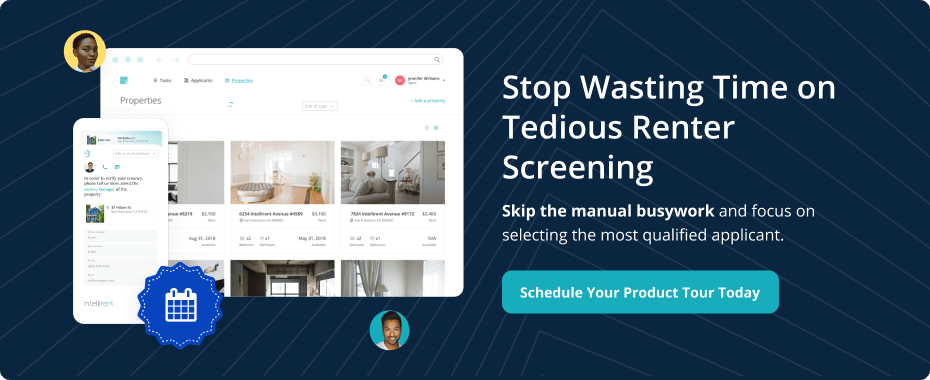August 01, 2023 • 6 min read

Selecting the right tenant can feel like picking your way through a minefield: one wrong step can spell disaster in the form of delinquent payments, property damage, reputational impact, or worse.
However, avoiding a minefield takes time and energy. You must move slowly, check your steps, and always be aware of your surroundings.
The tenant screening process works the same way and can be time-consuming and overwhelming for property managers — especially if you have to move quickly. But with enough planning, attention to detail, and the right tips and tricks, you can streamline the process and make it easier for yourself and your potential tenants.
This post covers eight critical tips to improve, streamline, and simplify your rental application approval process.
Rental Application Approval Process Basics
A rental application is a crucial step in the leasing process. During this stage, potential renters provide their personal information and consent to background checks to be considered for a rental property.
A rental application typically includes details like the applicant's name, contact information, employment history, income, rental history, and references. Property managers use this information to assess the applicant's suitability and determine if they meet the requirements to rent their property.
Though most property managers understand the importance of the rental application approval process, many still aren’t completing their applications as effectively or efficiently as possible.
Related Read: The Comprehensive Tenant Screening Checklist
Many property owners still rely on traditional, manual processes and paper applications. These processes can be cumbersome, difficult to organize, and time-consuming. Not only does this approach create excessive paperwork, but it also requires manual screening and double data entry. This can lead to errors and inefficiencies, including:
- Lost documents
- Illegible handwriting
- Misplaced or misentered information
You can eliminate these pitfalls by leveraging an online platform like Intellirent and digitizing your leasing application process.
Related Read: 4 Essential Tenant Screening Questions To Ask Every Applicant
Consequences of Poor Rental Application Approval Processes
Getting the application approval process wrong can have significant consequences for property managers. For example, renting to poor-fit tenants can result in delinquency, security issues, and property damage.
Take steps to thoroughly screen applicants to ensure they have a history of responsible tenancy, reliable income, and good references. Failure to do so can lead to costly repairs, legal disputes, and potential harm to other renters.
If your application process is not well-thought-out and documented, you also risk discrimination claims from rejected applicants. You must follow fair housing laws and ensure your application process is transparent, non-discriminatory, and based on objective criteria. A standardized screening process can mitigate these risks and provide equal treatment for applicants.
Finally, if your application process is slow and inefficient, your properties will be vacant for longer in between renters. Each day a property sits empty means lost income. By embracing technology and innovation, you can streamline your application process and fill vacancies more quickly and with fewer headaches.
The rental application approval process is crucial in selecting reliable and suitable tenants for rental properties. Property managers can improve the efficiency of their approach, reduce errors, and make more informed decisions by adopting modern technology and avoiding common pitfalls associated with manual processes.
1. Clarify and Simplify Instructions
One way to improve your rental application process is by providing clear and concise instructions to applicants. The more precise your instructions, the fewer back-and-forth questions you’ll have to field from interested applicants.
Create instructions that clearly outline what you need from the applicant, including:
- Required fields in your application
- Documentation needed
- Approval requirements
- Processing timeline
- Communication expectations
By providing comprehensive instructions, you streamline the application process and set clear expectations for both you and the applicants, speeding up the approval timelines and shortening your vacancies!
2. Use an Online Application
As mentioned earlier, paper applications make your process inefficient and error-prone. Instead, transition to an online application and enjoy a more straightforward process for you and your applicants.
Online application tools minimize your chances of errors and incomplete fields while providing built-in secure storage for applicants’ sensitive information and personal documents. As a result, property managers can save time, simplify the application process, and ensure a more seamless experience for applicants by adopting an online application system.
However, implementing the wrong online application tool can be an expensive and time-consuming error. So be sure you select one with the robust features you need. Intellirent offers a fully customized online application in addition to a host of other features, including:
- Professional property listing tool
- Credit and background reports
- Centralized collaboration tools
- And more!
3. Be Consistent When Screening
Consistency is key when evaluating rental applications. If you fail to develop and apply consistent screening criteria to all applicants, you risk getting hit with a discrimination claim by a rejected applicant.
Beyond discrimination claims, treat every applicant equally and evaluate applications consistently. This way, you establish trust and transparency with your renters from the onset of your relationship.
Consistency in screening processes and requirements also helps property managers make well-informed decisions based on objective standards rather than subjective judgments. As a result, you’ll make better, more informed decisions about your renters.
4. Set Realistic Requirements
Would it be nice if every renter you approve had a six-figure salary and a credit score over 800? Of course! But, unfortunately, it’s unlikely you’ll consistently be able to find renters who meet impossibly high requirements.
Instead, set realistic income, credit, and other requirements for your rental property. When setting your requirements, consider your location and the demographics of your rental applicants. For example, if your property is in a college town just down the road from campus, you’ll want to set different requirements than you might for a penthouse property in downtown Manhattan.
A general rule of thumb is to aim for a rent-to-income ratio of no more than 30%. This practice ensures that potential renters have the financial means to afford the rent without stretching their budget too thin. Setting realistic requirements increases the chances of attracting qualified applicants who can meet their rental obligations.
5. Utilize a Background Check System
Conducting thorough background checks is essential for evaluating your rental applicants. These checks typically include credit checks, criminal history screenings, and eviction history reviews. An online background check system can expedite the screening and approval process, saving time and effort.
By thoroughly vetting applicants, property managers can make informed decisions and ensure they select reliable tenants who are likely to fulfill their rental obligations. Consider using a tool like Intellirent to speed up your screening process! With Intellirent, you can attract, screen, and approve a reliable renter in less than 24 hours.
6. Conduct In-Person Walkthroughs
While sight-unseen rentals have become more common, conducting in-person walkthroughs remains crucial for finding the right fit and reducing the risk of fraud. Meeting the renter in person allows both parties to verify identities and establish a personal connection.
Additionally, in-person walkthroughs allow potential renters to fully understand the property's features, layout, and condition. Adding an in-person walkthrough to your process can feel inefficient, but this practice minimizes the chances of misunderstandings and promotes a smoother rental experience for everyone involved, saving time in the long run.
7. Keep Lines of Communication Open
Maintaining open lines of communication with applicants throughout the process is vital to a smooth and efficient rental application approval process. Regularly update your applicants on the status of their applications and any required next steps.
You can also take steps to communicate clearly before the application even begins! Post announcements and vacancies in shared spaces to reach a broader audience.
During the application process, remember that your applicants are people. Treat them humanly and helpfully to build rapport and positive relationships. For example, if an applicant doesn't meet the traditional criteria for income or credit, consider alternative documentation such as bank statements or tax returns to assess their financial stability. Ensure they understand their expectations and try to meet them where they are.
8. Use a Lease Agreement
Finally, protect yourself and your property by using a comprehensive lease agreement. A lease agreement legally safeguards your rights and outlines the terms and conditions of the rental agreement.
This document should include important details related to your property and the rental process, such as the monthly rent, security deposit amount, move-in date, pet requirements, and any additional fees or special requirements. Clearly defining these terms in the lease agreement establishes a solid foundation for a successful tenancy and mitigates potential disputes.
Improve Your Rental Application Approval Process the Easy Way
Implementing these eight processes and practices can help you improve your rental application processes, getting more qualified tenants in the door and into your available units and properties.
If you want to simplify your processes without sacrificing the quality of your background checks and application processes, consider implementing a leasing tool suite to help you with every step, from property listings to background checks.
Intellirent functions like a back office you can carry in your back pocket. Our leasing tools help you do your best work faster and make your day-to-day smoother.
See if Intellirent is the right tool for you by taking a free product tour today!
Published by Taylor Lembi
August 01, 2023
Related Articles
August 22, 2023 • 5 min read
June 06, 2023 • 6 min read
Subscribe For Insights
Get actionable leasing tips, tools, and best practices directly to your inbox. Don't miss out on the insights that'll help your team confidently find, screen, and approve the most qualified renters.


